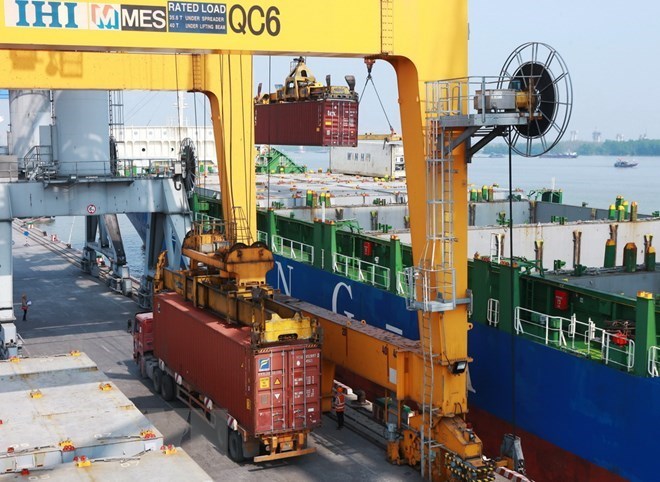
Vietnam’s economy grew at a fast pace in the first half of 2018 compared to the previous years, but there are indications that it is losing momentum – a problem not only in the last half of the year but also in 2019 and 2020.
Containers are loaded at Tan Vu Port of Hai Phong Port in Hai Phong city (Photo: VNA).
The remark was made by Dang Duc Anh, head of the analysis and
forecast section of the National Centre for Socio-economic Information and
Forecast (NCIF), at a discussion in Hanoi on August 8.
The growth rate reached 7.45 percent in the first quarter and
6.79 percent in the second quarter, but it is predicted to slow down to 6.72
percent during July-September and 6.56 percent in the last three months.
Meanwhile, average inflation is likely to be around 4 – 4.2 percent, according
to the NCIF.
Despite the 7.08-percent growth in the first six months,
there are many challenges during the rest of the year, including pressure from
the appreciation of the US dollar due to the possibility that the US Federal
Reserve could hike interest rates twice from now to the year’s end.
Resources for economic growth in the coming months are
unclear while the processing and manufacturing industry – a major driving force
– is depending on FDI firms and still at a low level in value chains. The
driving force from the FDI sector, which is becoming saturated in Vietnam, is
also reducing. Additionally, effects of business climate improvement policies
haven’t been clearly seen, he added.
Other challenges include impacts of the US-China trade war.
Echoing his view, other experts said the US-China trade
tension could lead to a domino effect on Vietnam’s economy.
Tran Toan Thang, head of the NCIF’s world economy section,
said the trade war, geopolitical risks and the US’s taxation policy reforms will
affect investment decision of multi-national American companies. The reduction
of corporate income tax in the US may also trigger a wave of tax cut or more
investment incentives in some countries to keep US businesses, which could
impact the competitiveness of Vietnam’s investment environment.
To maintain the growth momentum for the coming time, Vietnam
should create a more transparent investment climate, improve technological
capacity to attract more FDI companies, and actively respond to the US-China trade
war’s impacts and exchange rate changes.
Meanwhile, Luu Bich Ho, former Director of the Vietnam
Institute for Development Strategies at the Ministry of Planning and
Investment, said the country needs to press on with developing processing and
manufacturing and pay more attention to seeking export markets.
He noted amid US-China trade tensions, it is necessary to
prevent Chinese goods from taking advantage of the Vietnamese market to falsify
their origin to export to the US, or Vietnam could be taxed in a way China has
been.
Source: VNA
In Lac Thuy district, communes have been succeeded in promoting their One Commune-One Product (OCOP) products while others are still struggling to position their typical farming products in market. Some communes in the district still fail to have their products met OCOP programme’s requirements, while others have seen their certifications expired.
The inspectorate agency of Hoa Binh province has issued Official Dispatch No. 1090/TTr-PCTN to provincial departments, agencies, localities, business associations, enterprises, and investors regarding measures to improve informal component indexes of the Provincial Competitiveness Index (PCI).
Hoa Binh is taking concrete steps to improve its investment environment, with a strong focus on supporting businesses, settling obstacles for strategic investors, and creating opportunities for robust development in the coming years.
Under the blazing early summer sun, the construction site of Nhuan Trach Industrial Park (IP) in Luong Son district is abuzz with activities from dawn to dusk, a testament to the determination of the investor to meet their construction targets on schedule.



